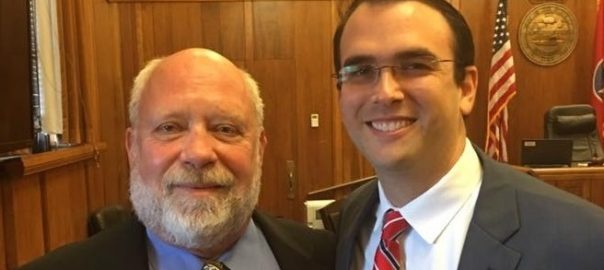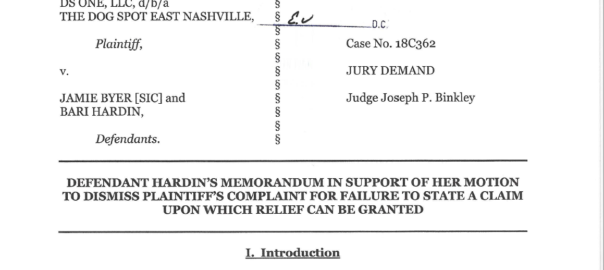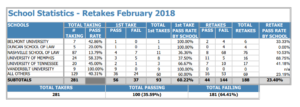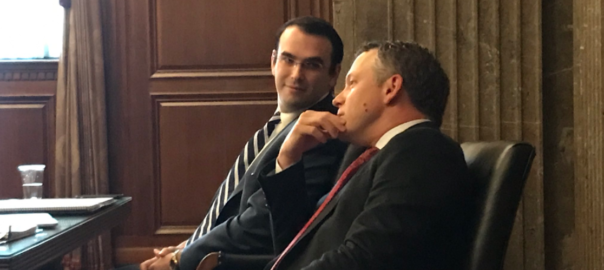In a resounding win, celebrated Nashville restaurateur Randy Rayburn has again beaten back a multi-million dollar defamation and false light lawsuit filed against him by Thomas Nathan Loftis, Sr., the former director of Nashville State’s culinary program. In a unanimous ruling, the Tennessee Court of Appeals affirmed the outright dismissal of Mr. Loftis’s claims on the basis that Loftis had advanced a “far-fetched and not a reasonable interpretation” of the statements that he had sued over, and that “the statements in the newspaper article are not defamatory as a matter of law.” The Court of Appeals also ordered Mr. Loftis to pay for the costs of the lawsuit, and it further ordered the Trial Court to determine whether Loftis must pay Mr. Rayburn’s legal fees.
Given the serious threat that the case posed to the viability of newsgathering in Tennessee, the lawsuit attracted national attention from First Amendment organizations like The First Amendment Center’s Newseum Institute and TechDirt. Following a disturbing trend in local media of inflating the legitimacy of almost uniformly baseless defamation lawsuits when they are filed but failing to cover them after they fail, however, the Court of Appeals’ decision has gone unreported in Nashville.
Mr. Loftis’s lawsuit was novel in that it was filed over statements that had been authored by a Tennessean newspaper journalist in an article in which Mr. Rayburn—the supposed source of the statements at issue—was not even quoted. As a result, the lawsuit attempted to run an end-around Tennessee’s source-protection statutes, and it also served as a warning that anyone who is even referenced in a news article containing critical coverage can be threatened with multi-year, multi-million dollar litigation. Had the lawsuit been permitted to go forward, it stands to reason that news sources would have been far less likely to speak to journalists on the record or to interact with the media at all.
Significantly, the case also involved a stunning, outright acknowledgement from Mr. Loftis’s counsel that Mr. Rayburn had been sued in part because the newspaper that had actually published the statements at issue was more likely to be able to defend itself. Specifically, during oral argument before the Court of Appeals, Mr. Loftis’s counsel had the following exchange with the Court:
Judge Neal McBrayer: “Why isn’t the Tennessean the proper party here?”
Gary Blackburn (Attorney for Tom Loftis): “Your Honor, there were practical reasons for that . . . . It is easier to bring a lawsuit against the person who uttered the words than against a publication that buys ink by the barrel, as they say, and has lots of resources.“
Unfortunately, this strategy—which is rarely acknowledged so openly—is all-too-common in the defamation world. Given the enormous costs of civil litigation, powerful people seeking to stifle criticism often file flagrantly baseless claims against those perceived to have limited resources in the hopes of being able to censor them. As a result, as the author has explained previously, being able to sue for defamation “provide[s] enormous space for the powerful and well-resourced to threaten, censor, abuse, and intimidate those who lack the means, knowledge, or fortitude to defend themselves.”
All considered, the Court of Appeals’ decision constitutes a total victory and complete vindication for Mr. Rayburn, who has maintained that the lawsuit was frivolous from the beginning. “We’re thrilled about this resounding win, which fully vindicates Mr. Rayburn and the First Amendment yet again,” said Daniel Horwitz, Mr. Rayburn’s attorney. “Filing a lawsuit this frivolous was a very poor decision, and unfortunately for Mr. Loftis, it is about to become an expensive one as well.”
The Court of Appeals’ unanimous decision, authored by Judge Andy Bennett, is available here. Selected case documents and media coverage are available below.
Like ScotBlog? Join our email list or contact us here, or follow along on Twitter @Scot_Blog and facebook at https://www.facebook.com/scotblog.org
Selected Case Documents:
–Plaintiff’s First Amended Complaint
–Defendant’s Motion to Dismiss First Amended Complaint
–Plaintiff’s Response to Motion to Dismiss (1)/Plaintiff’s Response to Motion to Dismiss (2)
–Defendant’s Reply to Plaintiff’s Response
–Transcript of Hearing on Defendant’s Motion to Dismiss
–*Order Dismissing Plaintiff’s Complaint With Prejudice
–Brief of Plaintiff-Appellant Thomas Nathan Loftis, Sr.
–Brief of Defendant-Appellee and Cross-Appellant Randy Rayburn
Selected Media Coverage:
-The Tennessean: Defamation lawsuit against restaurateur Randy Rayburn dismissed — again
-TechDirt: Judge Dumps Stupid Libel Suit Featuring A Man Suing A Third Party For Things A Journalist Said
-Nashville Business Journal: Nashville restaurateur Randy Rayburn faces $1.5 million lawsuit
-TechDirt: Former University Official Files Libel Lawsuit Against His Replacement For Things A Journalist Said
-Nashville Business Journal: Judge dismisses $1.5M suit against well-known restaurateur
-First Amendment Center’s Newseum Institute: Unusual Defamation Suit Targets Source of Story




